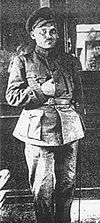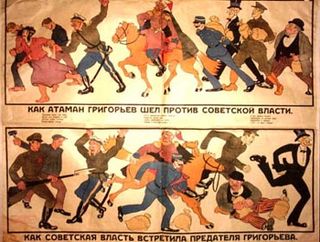- Nikifor Grigoriev
-
Nikifor Grigoriev 
Montage-photo of Servetnyk (1919)
Antonov-Ovseyenko (to the right) is cut-outNickname Otaman Grigoriev Born 1885
near Dunaivtsi, Podolia Governorate, Russian Empire (now Ukraine)Died July 27, 1919
village of Sentove, UkraineAllegiance Green Army, Red Army, White Army, Black Army Years of service 1904–1919 Rank Staff Captain (Russian Army)
Otaman (Ukrainian Army)
Division Commander (Red Army)Commands held Ukrainian Kherson Division
1st Trans-Dnipro Brigade (Ukraine)
1st Trans-Dnepr Brigade (Red Army)
6th Ukrainian Rifle Division (Red Army)Battles/wars Russo-Japanese War
World War I
Ukrainian Civil War
The Entente Intervention
Odessa, 1919Awards Cross of St. George Nikifor Grigoriev (c. 1885 – July 27, 1919) was born Nychypir Servetnyk in a small village of Zastavlia (now in the Nova Ushytsia Raion, Ukraine) was a paramilitary leader noted for numerous switching of sides and anti-Semitism. He was commonly known as "Otaman Grigoriev", as "Matviy Hryhoriyiv", "Matvey Grigoriev", or "Mykola Grigoriev".
He is sometimes misrepresented as the Otaman of the "Green Army". His association with the Green Army became a sort of misnomer due to collaboration with the army of Otaman Zeleny (stands for Green in Russian and Ukrainian) which led a major movement on all fronts against Directoria, Bolsheviks, and Denikin's Army. Although he cooperated with Zeleny those collaborations were marginal and Grigoryev was later ousted by the leader of the Green Army.
Contents
Biography
The Otaman was born as Nychypir Servetnyk in a small village of Zastavlia (still stands today) of Novo-Ushytsia uyezd in the Podolia Governorate. Servetnyk served in cavalry in the region of Kherson and participated in Russo-Japanese War in the Russian Far East serving in the Trans-Baikal Host. After his discharge he served as a gendarme in the town of Proskurov, Podolia Governorate.
Servetnyk volunteered to the army with the outbreak of the First World War and was enlisted as a Praporshchik (see Rank structure) to the 56th Infantry Regiment in 1914. In course of war he was awarded the Cross of St. George for bravery. Servetnyk eventually rose to the rank of Staff Captain (Russian: Штабс-капитан) in the 58th Prague Infantry Regiment (1917) and changed his surname to Grigoriev. During this period he became a member of Eser (Socialist-Revolutionary) Party. Following the Russian Revolution of 1917, he supported the socialist-oriented Ukrainian Central Rada of the Ukrainian National Republic. He served in the reorganized National Army of Ukraine and rose to the rank of Lieutenant Colonel.
Revolutionary period
In April 1918, he took part in the conservative coup d'etat led by Hetman Pavlo Skoropadsky which earned him the rank of Colonel. In summer of that year he revolted against the Hetman State and created his own insurgent army. He joined another revolt in November that year which was organized by Directoria. In December Grigoriev participated in the military campaign against the Russian forces of the South. During that campaign he took Mykolaiv, Kherson, Ochakiv, Oleshki. Before capturing Mykolaiv he overran the forces of already defeated Hetmanate of 545 soldiers. He occupied Mykolaiv on December 13 and appointed himself the city commissioner struggling against the city council. Grigoriev was appointed a commander of the Ukrainian Kherson Division of the Southern group of Otaman Hrekov until January 29, 1919, later the 1st Trans-Dnipro Rifllemen Brigade (~6,000 men) of the 3rd Trans-Dnipro Riflemen Division. He was later forced out of those cities by the Entente forces (Greeks) (see The Entente intervention in Russia). During this time Otaman Hrekov participated in the negotiations with The Entente forces to ally against the Bolsheviks. Grigoriev did not approve that and was especially upset when Vynnychenko was forced out of the office leading Petliura to head the Directoria Committee later on February 13. On January 29, 1919 Grigoriev sent a letter to the headquarters of the Zaporizhia Corps in Kremenchuk (a week after the arrest of Petro Bolbochan):
“ In Kiev gathered the Otamanate, the Austrian Fendryky Reserves, country-side teachers, and all kinds of careerists and adventurists who pose themselves for statesmen and big diplomats. They are not the professionals and definitely out of place, I do not believe them and move on to the Bolsheviks as after the arrest of Colonel Bolbochan I do not believe in the good of our Homeland. ” On January 25, 1919 Petliura ordered him and Otaman Huly-Hulenko to join the South-Eastern group against the Armed Forces of South Russia near Alexandrovsk and Pavlohrad. Grigoriev decided to ignore that order. He had not intentions to fight against the White forces as well as the forces of Makhno who operated in the area and were in the opposition to the Direcotria. Since that time he systematically ignored all the orders that were coming from the Headquarters of the Ukrainian Army. The similar situation was taken place throughout the Ukrainian Armed Forces at that time. Otaman Osmolov sent him telegram to stop his disobedience. On January 30 Grigoiev sent a representative to the Yelizavetgrad revkom claiming to be the Chairman of the Soviet Emissaries. He also sent a telegram to the revkom of Alexandrovsk with an approval for the actions of the Soviet Bolshevik Left-SR government of the Ukrainian SSR.
In the beginning of February 1919 Grigoriev attaked the Katerynoslav Kosh of Colonel Kotyk whom he captured as well. Later he sent a telegram to the Red Kharkiv informing that he caught the cat (implying to Colonel Kotyk). The Ukrainian Command immediately announced him outlaw warranting every citizen of the Republic to kill the deserter. On February 2 Blakytny-Ellansky arrived to Znamenka to organize the Soviet Ukrainian National government with the help of Grigoriev, but later were telegraphing back to Moscow not to hurry with the coalition of the Otaman due to possible infidelity. Grigoriev, nonetheless, continued his attacks onto the Ukrainian armies and effectively stormed Kryvyi Rih and Yelizavetgrad causing the Republican forces to withdraw out of the Central Ukraine to Podolia.
Allying with Bolsheviks
After the withdrawal of the Ukrainian forces out of Kiev, Otaman Grigoriev continued his negotiations with the Bolsheviks on February 18, 1919. Grigoriev together with his brigade became now part of the Red Army 1st Trans-Dnieper Riflemen Division (later expanded to the 6th Ukrainian Rifle Division), while Nestor Makhno led his troops as another brigade of that division and Pavel Dybenko who commanded the division was in charge of another brigade. He was still closely connected with the Socialist-Revolutionaries who had great influence over the rural population of the country. During that time he attacked the Askania-Nova preserve and started food requisitioning in the name of Revolution. The head of government of the Soviet Ukraine Christian Rakovsky sent Grigoriev a note of protest in that regard. In short time, however, April 1919 the preserve would be nationalized. In March 1919 he took Kherson where 4,000 Greek POWs were executed afterward. Later Grigoriev managed to take Mykolaiv and after a two-weeks battle on April 8 he occupied Odessa forcing the Greek-French forces to withdraw. At first he was appointed the commandant of the city, but Bolsheviks subsequently protested the plunder of Odessa by Grigoriev's bands. In May, Grigoriev deserted the Red Army after being ordered to assault into the Romanian territories in order to provide military support for the Soviet Hungary and with his units captured the city of Yelisavetgrad (modern Kirovohrad).
Grigoriev was known for his militant anti-Semitism and his men carried out many pogroms against local Jews in the Yelisavetgrad, Cherkasy and Kherson regions, which he controlled in May and June 1919. According to the Encyclopedia Judaica,
The ataman Grigoryev, who in May 1919 seceded from the Red Army with his men, was responsible for pogroms in 40 communities and the deaths of about 6,000 Jews in the summer of 1919.[1]
Grigoriev's uprising was supported by some Ukrainian peasants who were outraged by the Bolshevik policy of "war communism" (including rural confiscation of food), and were also hostile to the White movement that was backed by land-owners.
Grigoriev and Makhno
In July 1919, after suffering heavy losses against Red Army Grigoriev escaped to the areas controlled by Nestor Makhno and offered to join the forces against "the reds and the whites". His proposition was accepted.
Makhno and the Black Army did not trust Grigoriev. After 3 weeks of common actions against Bolshevik forces, Grigoriev openly disagreed with Makhno during negotiations at Sentovo on July 27, 1919 (today it is a village of Rodynkivka, Oleksandriv Raion, Kirovohrad Oblast). Grigoriev had been in contact with Denikin's emissaries, and was planning to join the White coalition. This was unacceptable to Makhno — he held a particular hatred of all monarchists and aristocrats since the time of his imprisonment. The White coalition (notably generals Shkuro and Krasnov) also shared Grigoriev's anti-Semitism, unacceptable to Makhno and his numerous Jewish aides. According to Peter Arshinov, Makhno and staff decided to execute Grigoriev. Chubenko, a member of Makhno's staff, accused Grigoriev of collaborating with Denikin (According to Arshinov, Denikin's emissaries were captured and executed) and of inciting the pogroms.[2] There are several accounts that give different circumstances of Grigoriev's death. Grigoriev threatened Chubenko and Makhno, drew his gun, and was shot and killed. The accounts of the event differ, and ascribe the final shot either to Chubenko, Makhno, or Makhno's wife Halyna Kuzmenko.[2]
Awards
He was a recipient of the Cross of St. George for bravery.
See also
Notes
External links
- Ataman of Pogroms Grigoriev (Russian)
- Bio in Russian (Russian)
- Universal of Grigoriev
References
- П. Аршинов. История махновского движения.
- Нестор Махно. Воспоминания.
- Дневник Г. А. Кузьменко (Издательство Терра, 1996 г., 496 рр. ISBN 5-300-00585-1
Categories:- 1885 births
- 1919 deaths
- People from Khmelnytskyi Oblast
- History of Ukraine
- People of the Russian Revolution
- People of the Russian Civil War
- Ukrainian military personnel
- Executed military personnel
Wikimedia Foundation. 2010.

